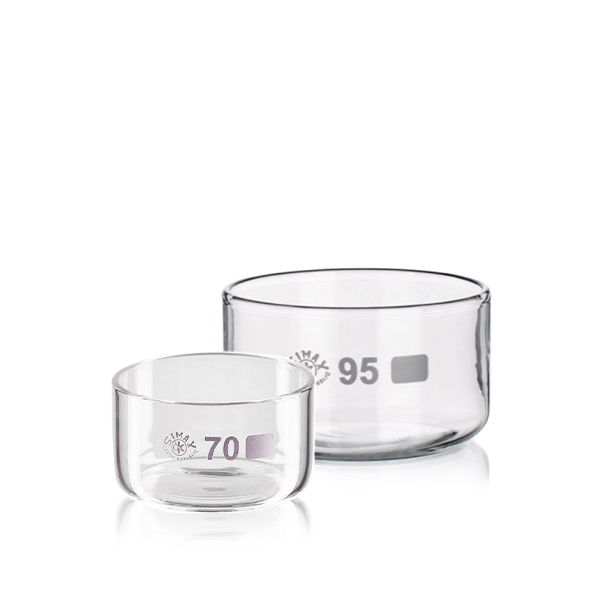Crystallising dishes
Crystallising dishes with a flat bottom
without a spout
made of borosilicate glass 3.3.

Crystallising Dishes Made of Borosilicate Glass 3.3
- Temperature-resistant up to +250 °C
- Resistant to acids, alcohols, and chemicals, except hydrofluoric acid and concentrated alkali solutions
- Dishwasher-safe
- Manufactured according to DIN 12337

In the chemistry laboratory:
- For crystallising solids from solutions or suspensions
- For evaporating a solution over a burner to accelerate crystallisation
- As a transparent tempering bath on a magnetic stirring plate for beakers or Erlenmeyer flasks
In the household:
- As a casserole or baking dish
- In molecular gastronomy
- In the catering sector

Crystallising dishes are primarily used to crystallise solids from solutions or suspensions by allowing the solvent to evaporate. They can also be used over a burner to speed up the crystallisation process. Unlike beakers, crystallising dishes are much flatter and lack measurement scales.
For example, a saturated copper sulphate solution can be placed in a crystallisation dish as a demonstration experiment. Over several weeks, as the water slowly evaporates, large, beautiful crystals will form.
Categories
Vials and caps for analytics
Vials & bottles for sample storage
Sterile & depyrogenated
HPLC consumables & lab accessoires
HALO® Fused-Core columns
HPLC syringe filters YETI
Polypropylene syringes
dandyVice - facilitate your workflow
FLUICS - Plug & Play Inventory Management for the Laboratory
Crimper & De-capper
Storage boxes
Laboratory glassware
Migration cells Sieg-Mi-Flex
The last of their kind: Remaining stocks
Beakers
flasks
Measuring cylinder
laboratory bottles
suction flasks
Test tubes and accessories
Funnel
Bowls
Cover glasses
Glass stirring rods
Accessories
Filter

